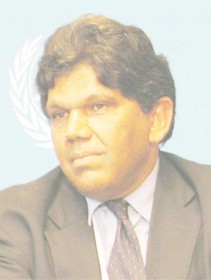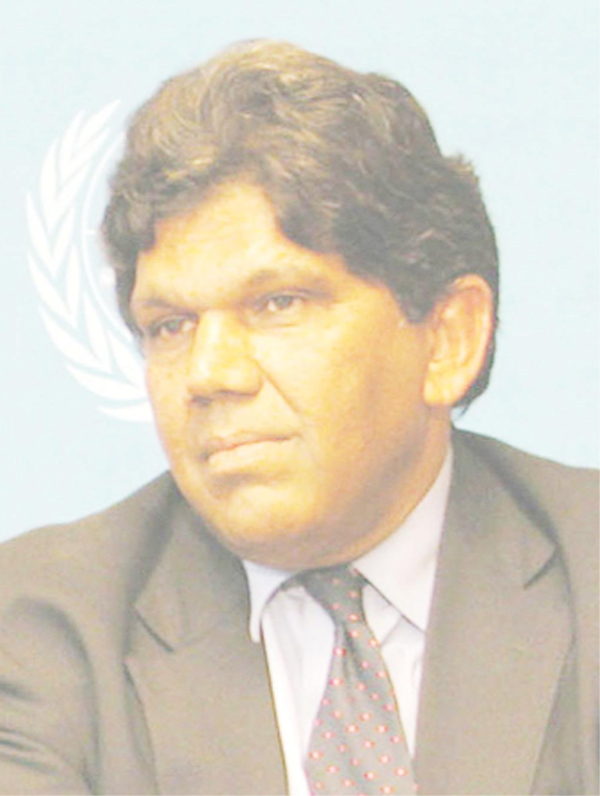Dr Bertrand Ramcharan, Ph.D. (LSE), Barrister-at-Law, is a former UN High Commissioner for Human Rights, Chancellor of the University of Guyana, Commissioner of the International Commission of Jurists, and Professor at the Geneva Graduate Institute of International and Development Studies. He is one of the founders of the newly established Guyana Institute of Public Policy, of which he is a Director. The Institute aims to generate thinking on issues that can help in the future cohesion and development of Guyana
 By Dr Bertie Ramcharan
By Dr Bertie Ramcharan
Public policy is defined in the academic literature as an area of study that deals with issues affecting the public interest and the general welfare. Some universities offer courses of studies and post-graduate degrees in public policy. A classic example is the Kennedy School of Government at Harvard University, where this author was a Fellow in 2004. Florida International University offers a post-graduate degree in public policy. Some institutes of public policy are thus university-based.
Some institutes of public policy have been established by national parliaments as independent think-thank institutions to bring fresh thinking on topics of their own choosing. This is the case, for example, with the Singapore Institute for Public Policy and the Kenya Institute of Public Policy. In Singapore, where its post independence growth and success have been built on drawing on the best minds available in the country, the institute of public policy plays a particularly dynamic role.
Some institutes of public policy are non-profit organizations. In Canada, the Institute for Research on Public Policy is an independent national, non profit organization that seeks to improve public policy in the country by generating research, providing insight and sparking debate that will contribute to the public policy decision making process and strengthen the quality of the public policy decisions made by Canadian governments, citizens, institutions and organizations. The Public Policy Institute of California is a non-profit organization dedicated to independent, non-partisan research on California’s economic, social and political issues.
In Guyana, the need for independent public-policy reflections is a striking one. The national independence movement of the 1950s had some clear policy objectives. One of them was to bring about Guyana’s independence. Another, controversial at the time, was to bring schools under Governmental rather than Church administration. In the 1960s one could discern governmental policy objectives for development. The current national development strategy is a contemporary example of a public policy document – leaving aside how it has fared in practice. Ever since its independence, unfortunately, Guyana’s development has been stultified by a lack of national political consensus. This is a difficult issue, one on which we must work in good faith.
Debates on public policy issues, ever since independence, have been affected to a great degree by partisanship – which goes well beyond the partisan political debates that are inevitable in any country. During the time of PNC-rule, its public policy initiatives were tainted by public perceptions about the ‘paramountcy of the party’ – even if some of the public policy initiatives were undoubtedly sound.
During the period of PPP governance, one can point to some sound public policy initiatives but, overall, they have been adversely affected by the lack of political consensus and by a broad feeling in the society that the governmental talent pool of the party is somewhat thin – by choice. Public policy debates in Guyana are, unfortunately, trapped in political bickering on all sides.
In the midst of all of this, the country has so far not yet succeeded, in its fifth decade of independence, in negotiating a system of governance that inspires confidence in all the peoples of Guyana. Both major parties have responsibility for this. The PNC overthrew the immediate post-independence system of governance, on which there was a reasonable degree of consensus, and brought in, through rigged voting, a system of governance that gave all power to the ruling party. The PPP gleefully inherited this system and has so far only been willing to tinker with it. This is shortsighted and does not serve the national interest.
Our fundamental problem thus remains the lack of consensus on the system of governance. On top of this, different parts of the society have different perceptions of our historical experiences. We need studies and dialogue in this area. Furthermore, there are long-range national security issues on which there is little or no debate or discussion in the country. It is on these matters that an institute for public policy can be helpful to Guyana in the long term.
In the Guyanese literature and media there are undoubtedly many superb contributions to public policy debates. The writings of our own Professor Clive Thomas on development challenges, globally and in Guyana, for example, are of the first order of quality. The pages of the Stabroek News contain many superb examples of public-policy contributions. The articles by the late Lloyd Searwar were fine examples of this.
One has the impression, though, that these and other fine contributions, are scattered and do not accumulate in a way as to be readily available for consultation by future, broad-minded Guyanese leaders. This is a gap that could, conceivably, the filled by a Guyana Institute for Public Policy.
The aim of the institute is to help bring together, on the Internet initially, and through publications and other activities if these prove feasible, selections of the best public policy thinking from Guyanese, and about Guyana. If we see good, concise public policy contributions in the media or in the literature, we will ask the authors to place it in on the web site of the institute. We will also invite contributions from those in a position to help shed light on present or future issues of national concern. We will bring these together in a book from time to time.
Participation in the institute is thus open to anyone. There is no membership fee! An advisory board is being posted on the Internet. To be selected for posting on the website of the institute, essays will be referred to three members of the advisory board, two of whom must support posting. We will be careful in our selections. It is our hope to bring together key essays in a print publication from time to time and to make it broadly available to the Guyanese community. We have so far not sought funding from anyone for any activity. We might do so in the future for specific activities, for example, the holding of a conference, a public lecture, or the publication and dissemination of policy publications.
We think that by proceeding in this objective and careful fashion we might be able to offer a contribution to the promotion of national consensus and development in Guyana. Experience will tell. We will not be partisan, are not aligned to any political party, and will avoid commenting on particular political developments or controversies. Unfortunately, Guyana is so full of this. The recent experience with the legislation on local government is a case in point.
One can say that, in Guyana, we have been blessed or cursed by our political leadership. We have so far not been successful in having as a leader someone who can help us transcend our divisions and bring us together. The national outpouring of feeling for Dr Cheddi Jagan after his death probably indicated that he was viewed by broad sections of the society as a genuine national leader, but his tenure was unfortunately a short one and he is reported to have been disgusted by the corruption within his government. When the current President came into office young people, especially, looked to a post-strife period. That, unfortunately, has not materialised. He was a fresh face, and faced daunting challenges for someone so young. He came, however, with tentacles that proved enduring.
The talent pool on offer for future leadership from both main parties, far from inspiring, causes groans and despair throughout the land. Talent there is, elsewhere. But as the late President Desmond Hoyte once famously said, Guyanese politics still remains largely a two-horse race.
I have found from my academic career that young people will look for the best thinking in the literature and hold on to it. We have to hope that at some time in the future, fresh minds will gain access to power in Guyana and will be looking for the best ideas to bring about national consensus and development. We have those fresh minds in view in wanting to help assemble a good pool of policy ideas from which they might draw.

